专升本英语基础语法句型
专升本英语语法重点汇总
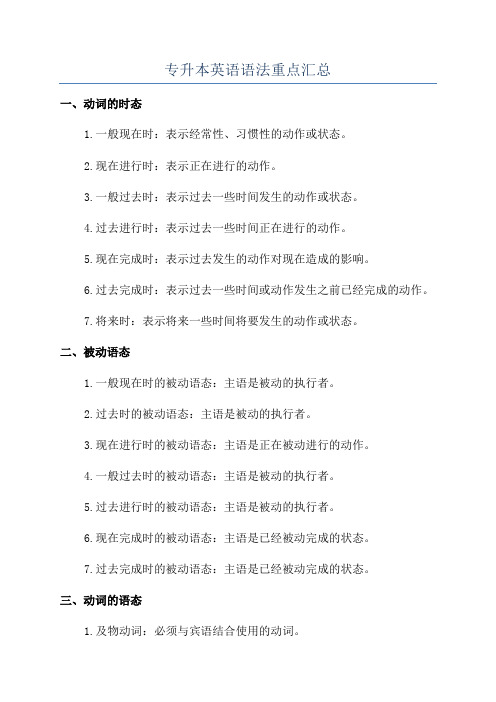
专升本英语语法重点汇总一、动词的时态1.一般现在时:表示经常性、习惯性的动作或状态。
2.现在进行时:表示正在进行的动作。
3.一般过去时:表示过去一些时间发生的动作或状态。
4.过去进行时:表示过去一些时间正在进行的动作。
5.现在完成时:表示过去发生的动作对现在造成的影响。
6.过去完成时:表示过去一些时间或动作发生之前已经完成的动作。
7.将来时:表示将来一些时间将要发生的动作或状态。
二、被动语态1.一般现在时的被动语态:主语是被动的执行者。
2.过去时的被动语态:主语是被动的执行者。
3.现在进行时的被动语态:主语是正在被动进行的动作。
4.一般过去时的被动语态:主语是被动的执行者。
5.过去进行时的被动语态:主语是被动的执行者。
6.现在完成时的被动语态:主语是已经被动完成的状态。
7.过去完成时的被动语态:主语是已经被动完成的状态。
三、动词的语态1.及物动词:必须与宾语结合使用的动词。
2.不及物动词:不需要与宾语结合使用的动词。
四、倒装句1.完全倒装:把助动词或情态动词放在主语前。
2.部分倒装:把助动词或情态动词放在谓语动词前。
五、情态动词1. can:表示能力、许可、可能。
2. could:表示过去的能力、许可、可能。
3. may:表示允许、可能。
4. might:表示过去可能。
5. must:表示推测、必须。
6. shall:表示将来的意愿。
7. should:表示建议、应该。
8. will:表示将来。
9. would:表示过去习惯、愿意。
六、名词1.可数名词:可以用来计数的名词。
2.不可数名词:不可以用来计数的名词。
3.特殊名词变复数形式。
4.特殊名词变单数形式。
七、形容词和副词1.形容词在句中的位置。
2.形容词比较级和最高级。
3.副词在句中的位置。
4.副词比较级和最高级。
五、代词1.主格代词:作为主语的代词。
2.宾格代词:作为宾语的代词。
3.物主代词:表示所属关系的代词。
4.反身代词:表示动作反过来作用于自己的代词。
专升本英语语法时态基础知识点归纳
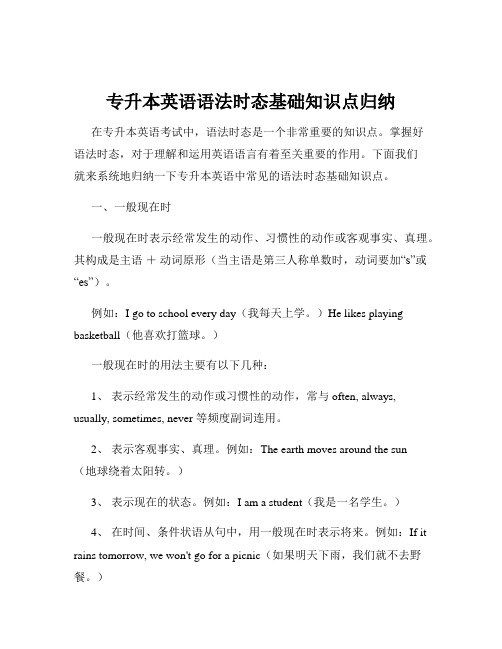
专升本英语语法时态基础知识点归纳在专升本英语考试中,语法时态是一个非常重要的知识点。
掌握好语法时态,对于理解和运用英语语言有着至关重要的作用。
下面我们就来系统地归纳一下专升本英语中常见的语法时态基础知识点。
一、一般现在时一般现在时表示经常发生的动作、习惯性的动作或客观事实、真理。
其构成是主语+动词原形(当主语是第三人称单数时,动词要加“s”或“es”)。
例如:I go to school every day(我每天上学。
)He likes playing basketball(他喜欢打篮球。
)一般现在时的用法主要有以下几种:1、表示经常发生的动作或习惯性的动作,常与 often, always, usually, sometimes, never 等频度副词连用。
2、表示客观事实、真理。
例如:The earth moves around the sun(地球绕着太阳转。
)3、表示现在的状态。
例如:I am a student(我是一名学生。
)4、在时间、条件状语从句中,用一般现在时表示将来。
例如:If it rains tomorrow, we won't go for a picnic(如果明天下雨,我们就不去野餐。
)二、一般过去时一般过去时表示过去发生的动作或存在的状态。
其构成是主语+动词的过去式。
例如:I played football yesterday(我昨天踢足球了。
)一般过去时的用法主要有以下几种:1、表示过去某个时间发生的动作或存在的状态,常与表示过去的时间状语连用,如 yesterday, last week, last year, ago 等。
2、表示过去经常或反复发生的动作,常与 often, always 等频度副词连用。
三、一般将来时一般将来时表示将来要发生的动作或存在的状态。
其构成有多种形式,常见的有“will +动词原形”和“be going to +动词原形”。
专升本英语语法教案+-+真题版
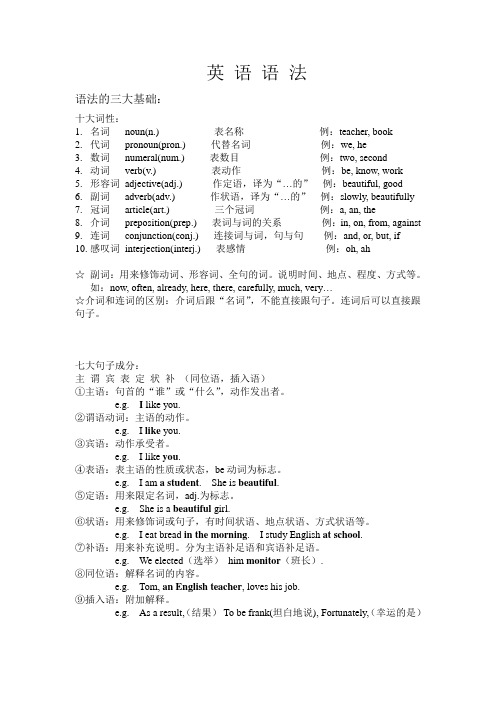
英语语法语法的三大基础:十大词性:1.名词noun(n.) 表名称例:teacher, book2.代词pronoun(pron.) 代替名词例:we, he3.数词numeral(num.) 表数目例:two, second4.动词verb(v.) 表动作例:be, know, work5.形容词adjective(adj.) 作定语,译为“…的”例:beautiful, good6.副词adverb(adv.) 作状语,译为“…的”例:slowly, beautifully7.冠词article(art.) 三个冠词例:a, an, the8.介词preposition(prep.) 表词与词的关系例:in, on, from, against9.连词conjunction(conj.) 连接词与词,句与句例:and, or, but, if10.感叹词interjection(interj.) 表感情例:oh, ah☆副词:用来修饰动词、形容词、全句的词。
说明时间、地点、程度、方式等。
如:now, often, already, here, there, carefully, much, very…☆介词和连词的区别:介词后跟“名词”,不能直接跟句子。
连词后可以直接跟句子。
七大句子成分:主谓宾表定状补(同位语,插入语)①主语:句首的“谁”或“什么”,动作发出者。
e.g. I like you.②谓语动词:主语的动作。
e.g. I like you.③宾语:动作承受者。
e.g. I like you.④表语:表主语的性质或状态,be动词为标志。
e.g. I am a student. She is beautiful.⑤定语:用来限定名词,adj.为标志。
e.g. She is a beautiful girl.⑥状语:用来修饰词或句子,有时间状语、地点状语、方式状语等。
e.g. I eat bread in the morning. I study English at school.⑦补语:用来补充说明。
专升本英语语法精讲
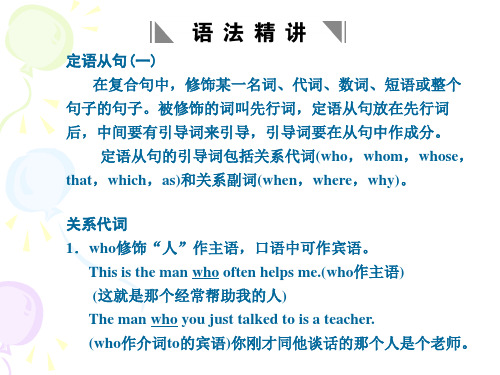
2.定语从句中用that不用which情况 (1)先行词是序数词或被序数词、形容词最高级以及the very,the only修饰。
This is the first film that I have seen at this cinema. 这是我在这个剧院看的第一部电影。 (2)先行词为不定代词all,one,none,anything, everything,nothing,little,much,few等或被much, little,just,few,no,any,every等所修饰。 He has little time that he can spare.他一点时间也抽不出。 Is there anything that I can do for you? 有什么需要我帮忙的吗? (3)当定语从句的先行词包括人或物时。
5.which (1)修饰“物”作主语、宾语。 The building which stands near the river is our school. 耸立在河旁边的那幢房子是我们的学校。 (2)修饰句子中的短语、整个句子,作主语、宾语,常引导一非限 制性定语从句,有时可插在句中。 I have to work on Sunday,which I don’t like. 我星期天得上班,这点我不喜欢。 They tried to catch the bird,which was impossible. 他们想抓住那只鸟,而这是不可能的。 (3)修饰一短语、句子时,也可作定语,使句子更加明确。 He came back late,by which time all the guests had already left. 他回来迟了,到那个时候所有的客人都已经走了。 I was told to go not by train but by bus,which advice I followed. 有人告诉我不要乘火车而乘汽车,我听从了此建议。
专升本英语句型100句
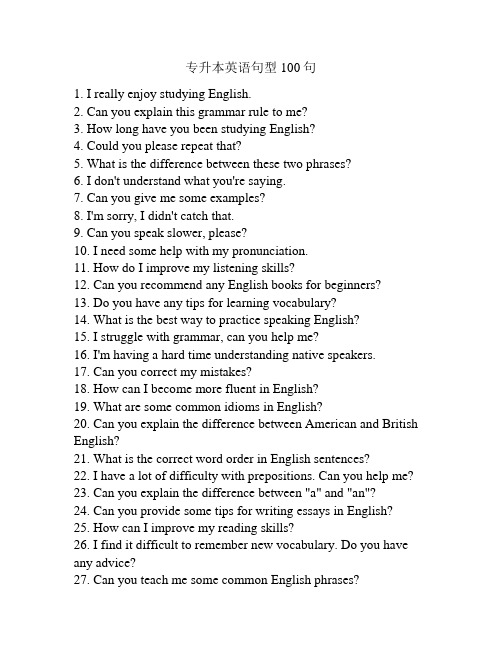
专升本英语句型100句1. I really enjoy studying English.2. Can you explain this grammar rule to me?3. How long have you been studying English?4. Could you please repeat that?5. What is the difference between these two phrases?6. I don't understand what you're saying.7. Can you give me some examples?8. I'm sorry, I didn't catch that.9. Can you speak slower, please?10. I need some help with my pronunciation.11. How do I improve my listening skills?12. Can you recommend any English books for beginners?13. Do you have any tips for learning vocabulary?14. What is the best way to practice speaking English?15. I struggle with grammar, can you help me?16. I'm having a hard time understanding native speakers.17. Can you correct my mistakes?18. How can I become more fluent in English?19. What are some common idioms in English?20. Can you explain the difference between American and British English?21. What is the correct word order in English sentences?22. I have a lot of difficulty with prepositions. Can you help me?23. Can you explain the difference between "a" and "an"?24. Can you provide some tips for writing essays in English?25. How can I improve my reading skills?26. I find it difficult to remember new vocabulary. Do you have any advice?27. Can you teach me some common English phrases?28. I'm struggling with verb tenses. Can you explain them to me?29. Can you help me understand the differences between formal and informal English?30. Can you explain the concept of subject-verb agreement?31. What are some common collocations in English?32. How can I become more confident in speaking English?33. What are some common prefixes and suffixes in English?34. Can you explain the use of articles in English?35. How can I improve my writing skills in English?36. Can you recommend any English movies or TV shows to help me practice listening?37. I have a hard time understanding English jokes. Can you explain them to me?38. Can you teach me some English slang words?39. What are some common English abbreviations?40. Can you explain the differences between active and passive voice in English?41. I struggle with understanding English accents. Can you help me?42. Can you explain the concept of phrasal verbs in English?43. How can I improve my pronunciation in English?44. Can you provide some tips for effective note-taking in English?45. I have difficulty with word stress. Can you help me?46. Can you teach me some common English idiomatic expressions?47. What are some common English proverbs and their meanings?48. Can you explain the concept of direct and indirect speech in English?49. How can I improve my listening comprehension in English?50. Can you recommend any English podcasts or audiobooks tohelp me practice listening?51. I have trouble understanding English contractions. Can you explain them to me?52. Can you teach me some common English phrasal verbs?53. What are some common English homophones and their meanings?54. Can you explain the concept of subject-verb-object sentence structure in English?55. How can I improve my speaking skills in English?56. Can you provide some tips for effective communication in English?57. I struggle with understanding English word meanings from context. Can you help me?58. Can you recommend any English websites or online resources for learning?59. What are some common English false cognates and their meanings?60. Can you explain the concept of compound words in English?61. How can I improve my vocabulary in English?62. Can you teach me some common English adjectives and their opposites?63. What are some common English irregular verbs and their past tense forms?64. Can you explain the concept of countable and uncountable nouns in English?65. I have difficulty with understanding English phrasal verbs. Can you help me?66. Can you provide some tips for effective time management in English exams?67. I struggle with understanding English conditionals. Can youexplain them to me?68. Can you recommend any English grammar books for self-study?69. What are some common English conjunctions and their uses?70. Can you explain the concept of relative clauses in English?71. How can I improve my writing fluency in English?72. Can you teach me some common English adverbs and their uses?73. What are some common English prepositions and their uses?74. Can you explain the concept of reported speech in English?75. I have difficulty with understanding English verb tenses. Can you help me?76. Can you provide some tips for effective listening in English conversations?77. I struggle with understanding English word formations. Can you explain them to me?78. Can you recommend any English grammar exercises for practice?79. What are some common English interrogative pronouns and their uses?80. Can you explain the concept of modal verbs in English?81. How can I improve my reading fluency in English?82. Can you teach me some common English conjunctions and their uses?83. What are some common English determiners and their uses?84. Can you explain the concept of phrasal prepositions in English?85. I have difficulty with understanding English gerunds and infinitives. Can you help me?86. Can you provide some tips for effective speaking in English public speaking?87. I struggle with understanding English word order. Can youexplain it to me?88. Can you recommend any English language schools for intensive study?89. What are some common English comparative and superlative adjectives and adverbs?90. Can you explain the concept of cleft sentences in English?91. How can I improve my listening fluency in English?92. Can you teach me some common English discourse markers and their uses?93. What are some common English interjections and their uses?94. Can you explain the concept of indirect questions in English?95. I have difficulty with understanding English conditionals. Can you help me?96. Can you provide some tips for effective reading in English academic texts?97. I struggle with understanding English word stress. Can you explain it to me?98. Can you recommend any English language exchange programs for speaking practice?99. What are some common English phrasal nouns and their meanings?100. Can you explain the concept of exclamatory sentences in English?。
浙江专升本英语考试基本语法知识汇总
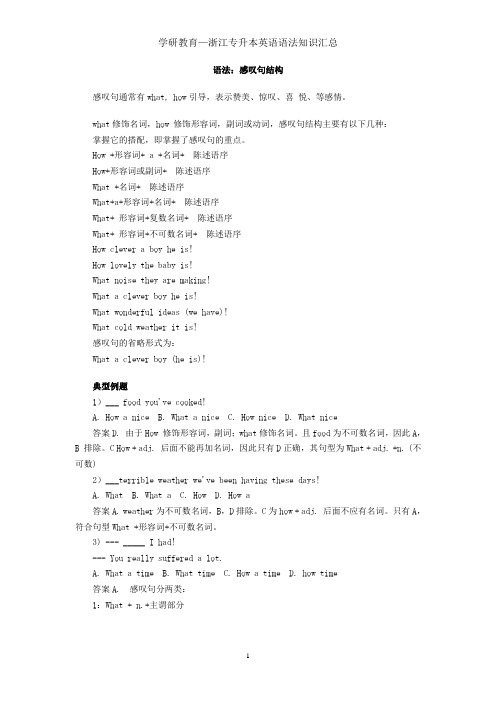
语法:感叹句结构感叹句通常有what, how引导,表示赞美、惊叹、喜悦、等感情。
what修饰名词,how 修饰形容词,副词或动词,感叹句结构主要有以下几种:掌握它的搭配,即掌握了感叹句的重点。
How +形容词+ a +名词+陈述语序How+形容词或副词+陈述语序What +名词+陈述语序What+a+形容词+名词+陈述语序What+ 形容词+复数名词+陈述语序What+ 形容词+不可数名词+陈述语序How clever a boy he is!How lovely the baby is!What noise they are making!What a clever boy he is!What wonderful ideas (we have)!What cold weather it is!感叹句的省略形式为:What a clever boy (he is)!典型例题1)___ food you've cooked!A. How a niceB. What a niceC. How niceD. What nice答案D. 由于How 修饰形容词,副词;what修饰名词。
且food为不可数名词,因此A,B 排除。
C How + adj. 后面不能再加名词,因此只有D正确,其句型为What + adj. +n. (不可数)2)___terrible weather we've been having these days!A. WhatB. What aC. HowD. How a答案A. weather为不可数名词,B,D排除。
C为how + adj. 后面不应有名词。
只有A,符合句型What +形容词+不可数名词。
3) --- _____ I had!--- You really suffered a lot.A. What a timeB. What timeC. How a timeD. how time答案A.感叹句分两类:1:What + n.+主谓部分2:How + adj. / adv. / v.+主谓部分。
专升本英语语法知识归纳(完整版)
1. we
the Journey to the West since we were young.
a. saw
b. have see
c. have seen
d. have been seen
2. hurry up! the film
for ten minutes.
a. had begun
b. has begun
B. would have repaired
C.have repaired
D. had repaired
4.He
just
(finish) his homework.
六:过去完成时(had done)与将来完成时(will have done)
必考点总结:
(1) 过去完成时:by /by the end of + 过去时间(by last week/month/year)
将来完成时:by /by the end of+将来时间 (by next/this week/month/year)
to me.
a. write b. will write
c. are writing d. would write
4. If Mr. Smith
back, please let me know.
A. will come B. comes C. came D. had come
必考点 2:4. the more..., the more...句型 完整句型:The +形容词/副词的比较级+(名词)+主语+谓语,the +形容词/副词的比较级+ (名词)+主语+谓语.
英语专升本语法知识点汇总
英语专升本语法知识点汇总一、时态。
1. 一般现在时。
- 用法:- 表示经常或习惯性的动作或存在的状态。
例如:I go to school by bike every day.(我每天骑自行车去上学。
)- 表示客观事实或普遍真理。
例如:The earth moves around the sun.(地球绕着太阳转。
)- 结构:- 主语为第三人称单数(he/she/it等)时,动词要加 -s或 -es,如He likes reading. 其他人称用动词原形,如I like reading.2. 一般过去时。
- 用法:- 表示过去某个时间发生的动作或存在的状态。
例如:I visited my grandparents last weekend.(我上周末去看望了我的祖父母。
)- 结构:- 动词一般用过去式形式。
规则动词的过去式一般在词尾加 -ed,如work - worked;不规则动词有其特殊的过去式形式,如go - went。
3. 一般将来时。
- 用法:- 表示将来某个时间要发生的动作或存在的状态。
例如:I will go to Beijing next month.(我下个月将去北京。
)- 结构:- 常见的结构有will+动词原形,be going to+动词原形(表示计划、打算做某事或有迹象表明即将发生某事)。
如He is going to have a party tonight.(他今晚打算举办一个聚会。
)4. 现在进行时。
- 用法:- 表示现在正在进行的动作或存在的状态。
例如:She is reading a book now.(她现在正在读一本书。
)- 结构:- be动词(am/is/are)+动词的 -ing形式。
5. 过去进行时。
- 用法:- 表示过去某个时刻或某段时间正在进行的动作。
例如:I was watching TV at 8 o'clock last night.(昨晚8点我正在看电视。
专升本英语语法知识点精讲
专升本英语语法知识点精讲对于许多想要通过专升本来提升自己学历的同学来说,英语语法是必须要攻克的难关之一。
掌握好英语语法不仅能够帮助我们在考试中取得好成绩,更能为今后的英语学习打下坚实的基础。
接下来,就让我们一起深入了解一些专升本英语语法的重要知识点。
一、动词时态动词时态是英语语法中的核心内容。
在专升本考试中,常见的时态包括一般现在时、一般过去时、一般将来时、现在进行时、过去进行时、现在完成时、过去完成时和过去将来时。
1、一般现在时表示经常发生的动作、客观事实或真理。
例如:“The earth revolves s around the sun”(地球绕着太阳转。
)其构成是主语+动词原形(当主语是第三人称单数时,动词要加“s”或“es”)。
2、一般过去时用于描述过去发生的动作或状态。
比如:“I played basketball yesterday”(我昨天打篮球了。
)构成是主语+动词的过去式。
3、一般将来时表示将来要发生的动作,常见的表达有“will +动词原形”和“be going to +动词原形”。
例如:“I will go to Beijing next week” (我下周要去北京。
)4、现在进行时表示正在进行的动作,结构为“be +现在分词”。
如:“She is reading a book now”(她现在正在读书。
)5、过去进行时强调过去某个时刻正在进行的动作,“was/were +现在分词”是其构成形式。
像:“I was watching TV at 8 o'clock last night” (昨晚八点我正在看电视。
)6、现在完成时表示过去发生的动作对现在造成的影响或结果,或者从过去开始一直持续到现在的动作。
“have/has +过去分词”为其结构。
例如:“I have learned English for five years”(我学英语已经五年了。
)7、过去完成时在过去某个时间点之前已经完成的动作,由“had +过去分词”构成。
专升本考试英语语法总结
专升本考试英语语法总结名目一、句子成分与基本结构(包括时态) (1)二、别定式 (5)三、动词得时态与语态 (30)普通如今时得特例 (30)普通过去时得注意点 (31)普通未来时得注意点 (31)四、非谓语动词 (32)五、复合式谓语 (42)六、动词得虚拟语气 (46)七、状语从句 (51)1、时刻状语从句 (51)2、地方状语从句 (53)3、缘故状语从句 (53)4.条件状语从句 (54)5.让步状语从句 (55)6.目得状语从句 (55)7.结果状语从句 (56)8.方式状语从句 (57)一、句子成分与基本结构(包括时态)主语 subject谓语 predicate宾语 object宾语补脚语 object plement表语 predictive定语 attributive状语 adverbialWARMUP:1)The teacher in the classroom、 2)Sang many songs and danced happily、 3)She attracts、4)Many people living in the country、 5)All the books on the desk over there、以上这些形式都别能构成英语句子。
英语句子(sentence)=主语+谓语(核心:主动词)I.八大成分得概念与构成1.主语(名词代词形):句子得主体,算是谓语陈述,讲明得对象。
If you want the rainbow you have to put up with the rain、别记忆风雨,如何见彩虹。
The secret of success is to start from scratch and keep on scratching、成功得秘诀在于从磨练开始,并要坚持别断磨练。
充当主语得形式:1)名词2)代词3)名词短语4)名词从句5)数词6)别定式7)ing形式8)介词短语(少见) 形式主语(名词从句,别定式,动名词)(见第六说主语与宾语)2.谓语:表示主语得行为或举行得活动。
- 1、下载文档前请自行甄别文档内容的完整性,平台不提供额外的编辑、内容补充、找答案等附加服务。
- 2、"仅部分预览"的文档,不可在线预览部分如存在完整性等问题,可反馈申请退款(可完整预览的文档不适用该条件!)。
- 3、如文档侵犯您的权益,请联系客服反馈,我们会尽快为您处理(人工客服工作时间:9:00-18:30)。
专升本英语基础语法句型句型1:There+be +主语+地点状语/ 时间状语.
There’s a boat in the river.
河里有条船。
句型2:find +宾语+宾补
He finds it very hard to travel around the big city .
他发现要环游这个大城市是很难的。
句型3:How do you like...?
How do you like China?
你觉得中国怎么样?
句型4:What do you like about...?
What do you like about China?
你喜欢中国的什么?
句型5:have nothing to do..
They have nothing to do every day.
他们每天无所事事。
句型6:keep sb. / sth. +adj./ V-ing/ 介词补语/ adv.
You must keep your classroom clean.
你们必须保持教室干净。
句型7:... not ... anymore/ longer
The old man doesn’t t ravel any more.
这位老人不再旅行了。
句型8:So+be/ 情态动词/ 助动词+主语.
He is a student. So am I.
他是一个学生,我也是。
句型9:... not ... until ...
He didn’t have supper until his parents came back.
直到他的父母回来他才吃饭。
句型10:比较级+and+比较级
The baby cried harder and harder.
那孩子哭得越来越厉害。
句型11:the +比较级,the +比较级
The more one has,the more one wants.
越有越贪。
句型12:... as +adj./ adv.+as ...…not as(so) +adj. / adv. +as .. Last Sunday the weather was not so wet as it is today.
上个星期天的天气不如今天的天气潮湿。
句型13:more/ less +adj.+than...
I think art is less important than music.
我认为艺术不如音乐重要
句型14:borrow ... from
I borrowed an English book from him.
我从他那借了一本英语书。
句型15:both ... and ...
IBoth you and I are students.
我和你都是学生。
句型16:either ...or...
Either you or he is wrong .
不是你错就是他错。
句型17:neither ... nor ...
Neither he nor I am a student.
我和他都不是学生。
句型18:... as soon as ...
As soon as I see him,I’ll give him the message.
我一见到他,我就把你的消息告诉他。
句型19:... so+adj. / adv.+that ...
I was so tired that I didn’t want to speak.
我累得连话也不想说了
句型20:Though...+主句
Though I like writing to my pen-friend,it takes a lot of time. 虽然我喜欢给笔友写信,但它要耗费我大量时间。
句型21:be going to
This afternoon I’m going to buy a English book.
今天下午我要去买本英语书。
句型22:be different from
I think this is different from Chinese names.
我认为这与汉语名字不同。
句型23:Welcome(back)to...
I think this is different from Chinese names.
我认为这与汉语名字不同。
句型24:have fun doing
We’re going to have fun learning and speaking English this term.
这学期我们将兴味盎然地学习和讲英语。
句型25:... because ... / ...,so ...
I don’t know all your names because this is our first lesson.
因为这是我们的第一节课,所以我并不知道你们所有人的名字。
句型26:Why don’t you ... / Why not ...
Why don’t you come to school a little earlier?
为什么不早点到校呢?
句型27:make it
Let’s make it half past nine.
让我们定在九点半吧!
句型28:have nothing to do..
They have nothing to do every day.
他们每天无所事事。
句型29:be sure/ be sure of/ about sth. / be sure to do sb.
I was not sure of / about the way,so I asked someone.
我对于怎么走没有把握,所以我问别人了。
句型30:between ... and ...
There is a shop between the hospital and the school. 在那家医院和那所学校之间有一家商店。
